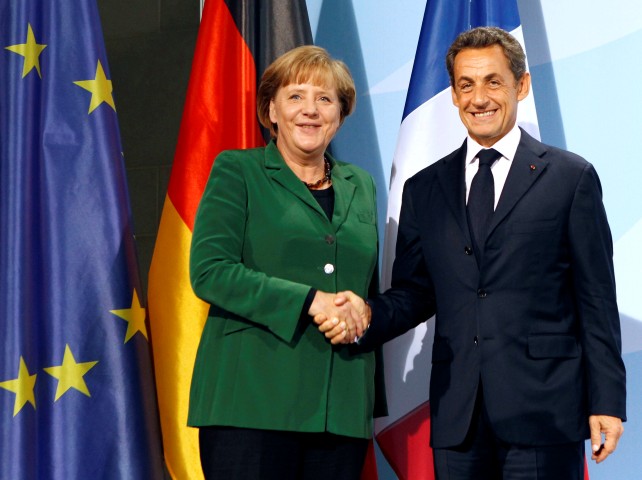Shrinking the Zone to Save the Euro

The Merkel-Sarkozy strategy for changing which countries are able to use the euro is taking shape. Their next efforts will likely include an attempt to change the treaties that govern how to exit the euro and how the countries more deeply integrate.
Additional treaty powers to decide who can be in the euro will be sought at the Brussels summit on December 9. But comprehensive treaty changes allowing deeper integration of the eurozone are unnecessary, the authority to do so already exists.
Its just that the current mechanism are unacceptable to the French and the Germans since they won't get to completely control who can join their new euro.
Until now it had been assumed that the euro was going to be the currency of the EU forever. Under existing treaties all EU states are obligated to join the euro (save Denmark and the UK, which can opt-in if they want) once they fulfill the convergence criteria.
With the new efforts to change treaties so that euro nations can leave the currency, that idea is effectively dead.
With the demise of mandatory euro membership, monetary policy within the euro will just concern itself with just a subset of EU members. It will now been seen as just another a cooperative Union enterprises, like the subset of countries that participate in EU patents.
Forming cooperative enterprises like this is not a new thing for the EU countries to do under existing treaties. Any of the existing methods could be used to reform the eurozone with tighter controls and deeper economic union, and with a minimum of institutional disruption.
However, the process demoting the euro from a requirement to some sort of enhanced cooperation has a significant difficulty. It might be harder for France and Germany to select who joins the deeper integration.
The treaties mandate open availability of membership and equal treatment for such projects. Enhanced cooperation, for example, “shall be open to all Member States, subject to compliance with any conditions” and shall “promote participation by as many Member States as possible.” (TFEU Article 328(1)).
This method of creating a more deeply-integrated euro would state the requirements for membership, and those requirements would be the same should other member states want to join later. Those standards need to be the same for all.
This approach might force the hand of stragglers like Denmark and Sweden to reconsider euro membership. A more deeply integrated euro, with evenly applied and real punishment for violators might be very attractive for those economies already effectively converged with the eurozone when the current crisis passes.
But what makes this enhanced cooperation unappealing to the euro powers is the inability to grandfather existing members into whatever standards there will be for membership from the start. France and Italy may not be able to meet any acceptable economic standards for membership.
Consequently, expect the eurozone next month to propose special treatment for themselves outside the typical methods of deeper interstate cooperation in the Union. Those who are not a part of the new euro may realize that getting “more Europe” within the more deeply integrated eurozone will mean “less fairness” to all, hardly a formula for a larger eurozone or a more durable Union.

